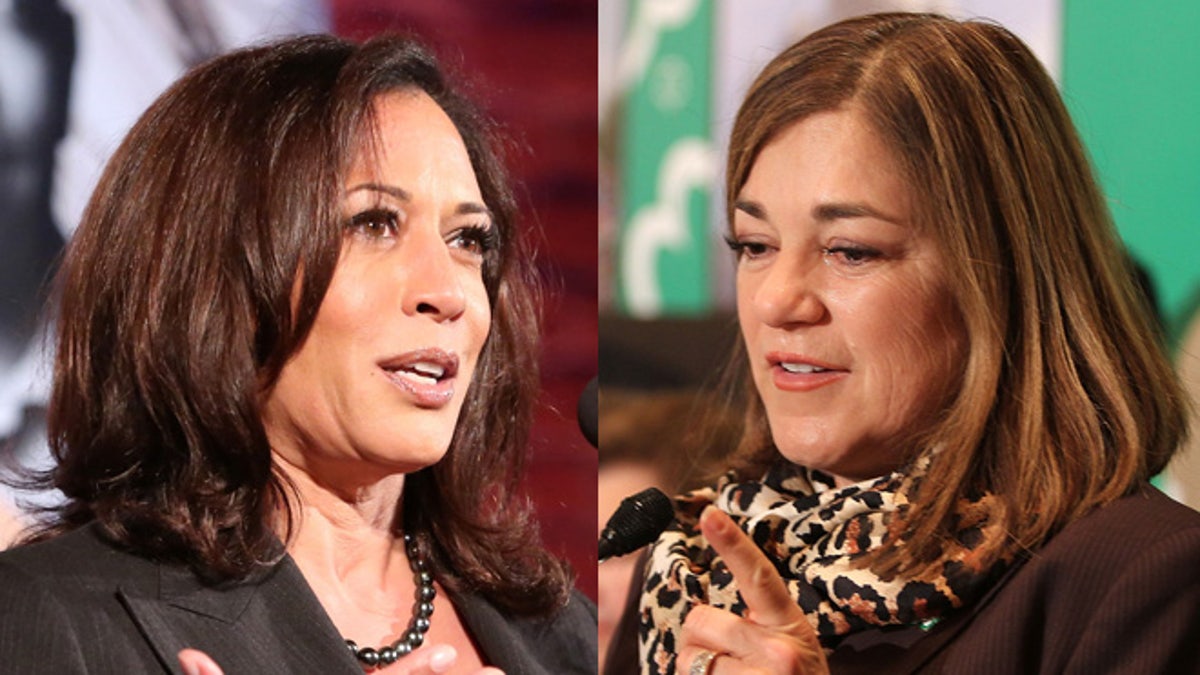
California Attorney General Kamala Harris, left; Rep. Loretta Sanchez, right. (Getty)
Rep. Loretta Sanchez’s entry into the race for the Senate seat of retiring Barbara Boxer now makes the election competitive, giving state Attorney General Kamala Harris – the only major Democratic candidate up until then – her first real challenge.
The race is momentous in several ways – two women are vying for a powerful seat in one of the most politically important states in the nation. And they’re both minorities, reflecting the changing demographics not just of California, but of the nation.
Harris, whose father is African-American and mother is Asian-American, is from northern California and immediately received support from top Democrats in Washington D.C., angering many Latinos in the Golden State.
Sanchez is the daughter of Mexican immigrants, and is from southern California.
Both women have blazed trails.
Harris, 50, become the first female, African-American and Asian-American state attorney general.
Sanchez, 55, and her sister, Linda, became the first sisters to be in Congress.
“Loretta Sanchez is not just a credible candidate, but a serious contender,” said Dan Schnur, director of the Jesse M. Unruh Institute of Politics at the University of Southern California. “But Harris is still a very strong front-runner. She’s run for statewide office twice before. Sanchez has only run for one seat in one district.”
At the outset, Sanchez would seem to have both a geographic and demographic advantage, Schnur said. Her district is large, and Latinos – who likely will back her in a matchup with Harris – are 40 percent of the state population, but they are just 17 percent of likely voters.
Asians, who are 14 percent of the population, are 11 percent of likely voters, and African-Americans are 6 percent of the population and likely voters.
Whites, on the other hand, make up 44 percent of the state’s adult population, but are 62 percent of California’s likely voters.
Sanchez, a one-time Republican who switched to Democrat over differences with her former party on social issues, is not well-known on a statewide level.
That is common in California, Schnur said, a large state with more 50 congressional districts.
Harris, by contrast, is known statewide by virtue of her position, and therefore has fundraising efforts all over California, Schnur said.
Some groups that supported Sanchez in her congressional runs say that while they still admire her, they are endorsing Harris.
“We’ve supported Loretta in her runs for Congress, we think she has a bright future," said a statement emailed to Fox News Latino on behalf of Emily's List, an influential organization that supports pro-choice women candidates. But, they added, "Kamala is clearly the first choice of California ... and we know she’ll take those priorities to Washington where they’re badly needed.”
Sanchez also will have her job cut out for her in getting supporters to get to the polls on Election Day.
“Although there are less voters in northern California, and more in southern California, the Bay Area [Harris’ turf] tends to be have more reliable voters, who turn out, than southern California,” Schnur said.
Sanchez needs to play catch-up financially, experts say.
Harris, who rolled out her campaign in January, had some $2.5 million in campaign funds by the end of March. Sanchez had $540,000 in her House campaign account that she can apply to her Senate race.
"Harris has several advantages going in –– mostly endorsements at this stage and higher statewide name recognition," said Louis DeSipio, a professor of political science and Latino/Chicano studies at University of California-Irvine. "To raise her profile among the statewide Democratic electorate, Sanchez will need to have the resources to advertise in multiple (expensive) media markets."
"Sanchez needs to raise a bunch of money quickly, so that her candidacy looks credible."
There are Republicans running for the seat, though both are seen as long-shots: Tom Del Beccaro, a former state party chairman, and two-term Assemblyman Rocky Chavez from San Diego County.
Democrats have the advantage in California, where they hold all statewide offices and are in control of the state legislature.
The challenge for both women will be exciting their base enough to turn out in large numbers at the polls next year. The primary will be in June 2016.
Sanchez is known among Latinos statewide.
"She made clear in her announcement that she thinks that she can do well among Latinos," Desipio said. "To do this she will need to invest heavily in mobilization and get-out-the-vote drives."
Schnur believes many in the Democratic leadership who lined up behind Harris after her announcement earlier this year might have supported Sanchez had she not waited so long to throw her hat in the ring.
The support for Harris by many top Democrats angered many California Latinos, who denounced the “anointing” of someone so soon, and took offense at what they saw as an indifference to their strong presence in the state.
Though Harris has tended to publicly identify most strongly with African-Americans, many Asian-Americans have expressed enthusiasm over her candidacy.
"The Attorney General's announcement certainly excites me as an Indian-American, and as a Californian," said Ash Kalra, a San Jose Councilmember, to NBC News. "To have such an outstanding public servant be the first to represent the community in such a powerful and prestigious position is something we all should be proud of as Americans."
Many experts believe that many voters will cast their ballots along ethnic lines.
"Both Harris and Sanchez have done well with white voters," Desipio said. "Sanchez doesn't have a lock on Latino votes if Harris does a better job mobilizing them and speaking to issues of concern to Latino communities."
"The black vote isn't all that big, so it's not going to be determinative."












































